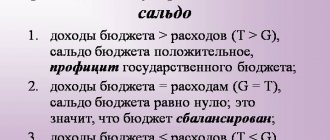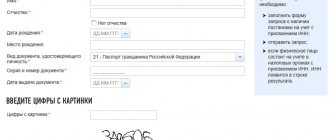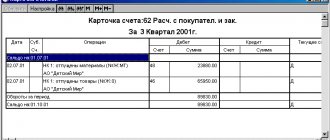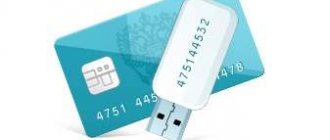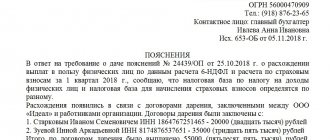What kind of blocking are we talking about?
The reasons and nuances of blocking are described in detail in Art. 76 NK:
- You owe taxes and contributions. The tax office was waiting for you to pay yourself. Then I sent you a demand. Then she waited some more, but the arrears were still not repaid.
- You did not submit your declaration or reporting on time. After 10 days, the tax office may block your account. You will not be able to fully use it until you report.
- The tax office conducted an audit and assessed a fine. If you do not have property that can serve as security for the execution of the decision, there are grounds for blocking. Sometimes the account is blocked immediately after verification.
Example with tax arrears. You have 100 thousand rubles in the bank - this is money for rent, salary, or just your personal balance as an individual entrepreneur. You assessed but did not pay tax, let’s say 10 thousand rubles. The tax office will send a decision to the bank according to which you will be able to make payments for 90 thousand rubles, but will not be able to make payments for the remaining 10 thousand.
https://youtu.be/fkEvwe1mVbE
Results
The Tax Code of the Russian Federation and Law No. 115FZ are the main grounds on which an account is blocked. This applies to any citizen, regardless of current status. Rosfinmonitoring and the Federal Tax Service have opened official websites where everyone can obtain information regarding finances when the need arises.
But in the second case, the information is available only to banks and other structures responsible for the monetary transactions of a company, individual entrepreneur or individual. To check accounts on the official website of the Federal Tax Service, it is enough to know the TIN of the partners. And enter it in the appropriate field.
Grounds for blocking a Federal Tax Service account
The legislation of the Russian Federation establishes a list of circumstances under which account blocking is possible:
- The presence of unpaid fines, penalties, fees and taxes. First of all, tax officials inform the debtor about the need to repay the debt. If there is no response from him, the authorities block the account.
- No declaration. If the company has not submitted tax reports before the deadlines established by law, then it has an additional 10 days to do so. If there is no declaration after this period, blocking occurs.
- Failure to confirm receipt of electronic documents. Tax officers send notifications and requests electronically. The company confirms their receipt within 6 days - for this you need to send an electronic receipt. If it is absent, the account may be blocked after 10 days.
The following circumstances are grounds for blocking:
- one of the counterparties is engaged in terrorist activities;
- an operation was performed in the amount of 600 thousand rubles;
- operations are carried out on behalf of persons who are wanted;
- the bank suspects falsification of documents submitted by the client to confirm the legality of the transaction;
- The organization carries out a large number of money transfers in favor of individuals.
Legislative regulation of the issue
Legislative regulation of the issue is carried out by the Tax Code of the Russian Federation. Article 76 of the Tax Code describes the possibility of imposing a BA and the very procedure for suspending actions. You can also include here the Order on the procedure for informing banks, issued by the tax office on March 20, 2020 with the number ММВ-7-8-117 and the Tax Order of February 13, 2020 with the number ММВ-7-8-179, which approves the forms of documents and requirements when paying taxes and fees.
| ★ Best-selling book “Accounting from scratch” for dummies (understand how to do accounting in 72 hours) > 8,000 books purchased |
Procedure for checking restrictions (suspensions) of account transactions
If the initiator of account blocking is the tax office, then the procedure is as follows:
- Making a decision to block an account
- Sending the decision to the taxpayer's bank.
- Transferring a photocopy of the decision to the taxpayer with a receipt receipt against signature
- Informing the tax office by the bank about the amount of funds in the client’s account.
If the initiator of account blocking is a bank, then it performs the following actions:
- informing the client about the blocking of the account with references to legislative norms;
- sending a request to provide documents that confirm the legality of transactions;
- studying documents and making a decision to remove the blocking.
Being left without a bank account is not the best prospect for any entrepreneur. This means that for some period of time the company’s activities will completely freeze: it will be impossible to pay suppliers of products or raw materials, it will not be possible to withdraw money or transfer it to another account.
Account blocking can be canceled in several cases:
- A legal entity or entrepreneur has paid debts in the form of taxes, a fine, or this amount has been collected by the inspectorate. All restrictions will be lifted when they provide a document confirming that the debt has been repaid. To speed up this process, you can submit the papers to the tax office in person with an application for unlocking. Tax authorities must make an appropriate decision no later than one day from the date of receipt of the papers.
- Documents were provided, as well as relevant declarations. In this case, the INFS is obliged to cancel the blocking no later than the next day. If the declarations were sent by mail, you must provide a receipt or check from the post office confirming mailing on time.
- A request for unblocking was received from a legal entity. The right to make this application arises when the amount of funds in the account is greater than that specified in the resolution on freezing expenditure transactions. This paper is submitted in any form and must contain an account that has sufficient financial resources to pay off debts. The Federal Tax Service is obliged to review the application within two days and suspend restrictions on blocking debit transactions on the account.
The unblocking procedure involves full repayment of the debt.
No later than one day after the blocking is lifted, the Federal Tax Service sends the decision to the financial institution, and a copy of the decision to the legal entity. The latter must confirm this document with a receipt or other method indicating the date of its receipt.
Important! If these deadlines are violated, as well as in case of illegal blocking of the account, the Federal Tax Service will be obliged to pay the victim interest for the days of blocking. The procedure for their calculation is regulated by clause 9.2 of Article 76 of the Tax Code.
If the decision to suspend the account was initially unlawful, then interest is also accrued for each day from the fact that the financial organization receives a decision to suspend expenses on the accounts. The interest itself is accrued on the amount that was blocked, that is, the amount that the legal entity could not dispose of during the blocking process.
In case of an unlawful act on the part of the Federal Tax Service, the entrepreneur receives interest
Thus, the Federal Tax Service has the right to impose restrictions on the current account only when there is an obvious fact of improper fulfillment of its requirements described in the Tax Code. In case of unlawful suspension of the taxpayer's accounts, the tax office must compensate for the material damage of the legal entity in the form of interest on the blocked amount. The suspensions themselves on taxpayer accounts of the Federal Tax Service can be checked online in a matter of seconds.
When the inspection does not have the right to block an account
So, blocking an account may be considered unlawful in the following situations:
Disable
- failure to submit accounting (financial) statements on time (Letter of the Ministry of Finance of the Russian Federation dated July 4, 2013 No. 03 02 07/1/25590);
- failure by the tax agent to submit on time the calculations provided for in Part II of the Tax Code of the Russian Federation (clause 23 of the Resolution of the Plenum of the Supreme Arbitration Court of the Russian Federation dated July 30, 2013 No. 57);
- the presence of an error in the submitted tax return, if it is not a basis for refusal to accept the return (for example, an incorrectly specified checkpoint) (Letter of the Ministry of Finance of the Russian Federation dated July 4, 2013 No. 03 02 07/1/25589);
- failure to submit information on the average headcount on time (Resolution of the Federal Antimonopoly Service of the Moscow Region dated February 27, 2009 No. KA-A40/644-09);
- failure to receive the declaration on time by the inspection due to the fault of the post office or telecommunications network operator (Resolution of the Federal Antimonopoly Service of the Moscow Region dated November 10, 2010 No. KA-A41/13633-10);
- signing of the declaration by an unauthorized person (Resolution of the Federal Antimonopoly Service No. F09-3372/13 dated May 6, 2013 in case No. A60-31906/12, No. F09-6635/11 dated October 19, 2011).
Disable
* * *
So, we found out that Art. 76 of the Tax Code of the Russian Federation establishes a closed list of grounds for suspending transactions on taxpayer accounts. All other grounds are grounds for challenging the decision.
The tax authority has the right to suspend transactions only for those accounts that are opened under a bank account agreement. He does not have the right to suspend operations on transit, loan, deposit accounts, as well as accounts opened for joint activities.
If there is more money in the account than indicated in the decision to suspend operations, operations in excess of this amount can be carried out. However, if a tax return is not submitted, the account is blocked completely. Also, the suspension of account transactions does not apply to payments in a queue earlier than tax write-offs.
Blocking an account creates problems in the current activities of the enterprise, and to avoid this, it is recommended not to delay sending declarations by mail or telecommunication channels until the last day, and also not to delay paying taxes and fees. If the suspension does occur, then the company has the power to speed up its cancellation by eliminating the reason for blocking the account and notifying the inspectorate as quickly as possible.
Disable
How to find out about account blocking on the Federal Tax Service website
The tax office will send the decision to suspend operations to the bank and to you. You will most likely receive it later. But if you have a caring bank, it will immediately notify you via SMS, in your personal account and mobile application that it has received a decision from the tax office.
In any case, the tax bank will be able to report a blocking decision only when it receives the decision. He must fulfill it immediately. That is, you will learn from the bank about the actual suspension of operations and the reason for the blocking, and not about the tax authorities’ plans.
Another solution may come to you through the reporting system, but this depends on the settings. And this still will not help you unblock the account without fulfilling the tax requirements.
An honest and law-abiding bank cannot do this. And if some bank does this, this does not say anything about its concern - rather, it is a catch and a reason to create serious problems for the client. And maybe even all clients.
Blocking is one of the extreme measures taken by the tax authorities. They resort to it when reminders of the arrears and demands to repay them do not work. And when the report deadline has arrived, and the taxpayer has not provided it. The tax office has no choice but to block the account. Usually, after this, taxes are paid immediately and reports are submitted.
If the bank warns the client about the upcoming blocking, in fact, it helps to evade responsibility to the state. The reasons and circumstances for suspending operations on an account vary, and sometimes the tax office makes mistakes. But the bank has no right to get involved in this and figure out who is to blame.
According to the law, it is impossible to open accounts if the client has a tax suspension. If one account is blocked, it will not be possible to open a second one either in this bank or in another.
On the tax service website you need to find a system for informing banks about the status of processing electronic documents.
In the menu, select the first item - “Request for current suspension decisions.” Data entry fields will appear:
- TIN. You need to enter the TIN of the taxpayer whose account you want to obtain information about.
- BIC. The service is intended for banks, so it is supposed to include the BIC of the bank that generates the request. An ordinary user can enter any real BIC.
As we can see, in relation to the accounts of the taxpayer under audit, there are decisions to suspend transactions on current accounts. In the table below, the system shows their details. Information about the reasons for blocking and the amount of arrears is not shown.
Is it possible to find out information by TIN?
Having only the TIN number of an organization, it is extremely difficult and almost impossible to find out any information about it. The same applies to the current account number.
Banking institutions do not have the right to disclose such data, because it is exclusively confidential.
It is possible to request such data only by a court decision through the Federal Tax Service or the Pension Fund of the Russian Federation. All other options that promise to provide the information you are looking for are illegal procedures and activities.
How to find out about account blocking on the Federal Tax Service website
In order to obtain information about blocking an account on the tax website, you need to perform only 2 steps.
The check takes place online in a few seconds. To do this, you must select in the information system.
A form for filling out information appears on the same page. The TIN is required for the taxpayer for whom information is needed. You can take the BIC of any bank - this will not affect the result.
After clicking the “Send request” button, the necessary information will appear.
If the account is blocked, debit transactions are not possible. Finding out about account blocking on the tax website is the first step to solving the problem. Next, you need to figure out what caused such actions by the tax authorities, especially if the Federal Tax Service did not send an official document indicating the grounds and amounts. After all, there is always the possibility of a system failure.
You can check online at any time whether your current account is blocked by the tax office. Since this service allows you to find out the decision numbers, finding out the details on them will not be difficult.
If the tax authorities made a mistake, the department will have to compensate the victim for losses. It pays interest in the amount of the refinancing rate for each day of inactivity.
It happens that the Federal Tax Service did not send a preliminary request for voluntary repayment of the debt. Even if there were grounds for limiting expenditure transactions, without the previous step it would be illegal.
If the sanction was imposed lawfully, the money will have to be paid. You can do this voluntarily, or you can wait for the first receipts - the funds will be debited automatically.
Informing financial organizations about the status of document processing is a service from the Federal Tax Service that allows financial and credit organizations like banks to comply with the tax authorities’ requirements to limit expenditure transactions for taxpayers who have violated Article 76 of the Tax Code. If an entrepreneur has violated at least one of the points listed in the previous section, then the Federal Tax Service has the right to initiate a procedure for freezing the violator’s bank accounts.
The system itself operates on the basis of the Central Bank’s regulations dated November 6, 2014. This paper regulates the procedure for interaction of the Federal Tax Service with financial and credit organizations. The form of messages sent by tax authorities to banks assumes electronic form and is prescribed in Regulation No. 311-P.
Important! An information system is needed primarily so that the bank has timely information that makes it clear whether a new account should be opened for a person or not. If penalties have been imposed on a legal entity, then no bank has the right to accept its application to open an account.
For example, a business entity was a client of one bank, but did not fulfill its obligations to the tax authorities and its account was frozen. Then he can go to another bank and try to open a spending account there. A bank that does not have reliable information may commit an unlawful act and open an account for an unscrupulous legal entity.
Sending a request and receiving results
Freezing is not a closed process. Before an official notification from a bank or the Federal Tax Service, anyone can check the blocking, a competitor of a businessman, or the financial institution itself. You can check the blocking of your current account by the tax office online in advance in several ways:
- Using the official tax website for TIN on the bank information service, where you can find out the necessary information even if the official blocking has not yet occurred;
- In the Financial institution where the account was opened or on its official website in your personal account.
It is worth examining in more detail the procedure for checking restrictions and what actions need to be performed.
You need to go to the tax service website. The information is freely available - there is no charge for obtaining it.
To do this you need:
- go on the website;
- click on the section “About the Federal Tax Service”, then on the subsection “Interaction with other government agencies”;
- click on the link “Interaction with the Central Bank”;
- switch to the Bankinform service;
- enter the TIN of the entrepreneur or company in the field;
- register the bank's BIC.
Another way to check account information is to go to your bank's online banking or contact the office of a financial institution.
If a company is faced with punishment due to unpaid taxes, fines and penalties, then only the amount that is subject to collection will be blocked in the account. The company has the right to dispose of other funds at its own discretion.
If operations were suspended due to unsubmitted declarations and violation of the rules of electronic document management, then the account along with all the money is completely blocked.
However, there are operations that are carried out even when the account is blocked:
- transfer of taxes and other fees to the budget;
- compensation for damage to life or health by court order;
- payment of alimony by agreement or court decision;
- transfer by the resigning employee of salary and severance pay upon receipt of a writ of execution;
- occasionally - transferring salaries to working employees without a court order.
There are also unpleasant consequences of blocking:
- Inability to register a new bank account. For several years now, financial institutions have been deprived of the right to open accounts for entrepreneurs and organizations that have a blocked account, even if it is opened in another institution.
- Difficult payments with partners. The bank will continue to accept incoming payments, but there will be no ability to manage the funds.
- Inability to enter into contracts. Information about whether a particular organization’s accounts have been blocked is posted in the public domain – anyone can familiarize themselves with it. If an entrepreneur or organization has a blocked account, then partners and counterparties will begin to doubt that the financial position of the individual entrepreneur or legal entity is sufficiently stable.
We do not have confirmation of this information. There is only a post in the messenger, from which it is impossible to determine the authenticity of the message. It could be fake news or an attention grabber. Kommersant writes that the bank has not confirmed its involvement in this message.
What should a business owner do if there is a blockage?
Eliminating the cause of the “freeze” is the only way for those who want to fix the existing problem. First, they learn everything about the very reason for the actions. Then they check to what extent the actions of the tax authorities were legal.
Finding out about the blocking itself and its reasons is not difficult. It is much more difficult to correct the current situation.
Different actions may be required depending on the cause:
- Transfer of an overdue declaration or report.
- Submitting calculations for personal income tax or insurance premiums.
- Pay off the existing arrears, if the debt is related specifically to it. After this, tax authorities will need documentary evidence that the obligations have been fulfilled.
- Sending receipts for receipt of requests, or providing other electronic interaction with the tax office.
Reference! It is worth checking not only the grounds themselves, but also the amount that the tax authorities require to be reimbursed.
How to find out about account blocking on the Federal Tax Service website
The rules for imposing restrictions on expense transactions, as well as on the transfer of electronic funds, are given to the Tax Service by Article 76 of the Tax Code of the Russian Federation. The decision to block an account is made by the head of the tax authority or his deputy. There are several reasons for this:
- the taxpayer did not comply with the inspection’s request to pay the tax, penalty or fine;
- the taxpayer did not submit a tax return within 10 days after the deadline for its acceptance;
- the taxpayer did not provide explanations or documents requested by the Federal Tax Service within the prescribed period.
If there are not enough funds in the account, then the payment according to the decision of the Federal Tax Service will be put in a queue. In this case, all payments incoming to the account will be accepted without restrictions, and write-offs will occur in accordance with the priority established by Article 855 of the Civil Code. Tax arrears according to tax regulations are paid off in third place.
Account blocking options
A ban on expense transactions can be imposed on any of the accounts belonging to the guilty taxpayer, including an account opened in foreign currency or precious metals. An exception to this rule applies to special election accounts and special accounts of referendum funds - they cannot be blocked (clause 1 of Article 76 of the Tax Code of the Russian Federation).
Read about whether it is possible to block a collateral account here.
Either a specific amount or the entire balance on the account may be blocked on the account, regardless of its value and its change during the blocking period. That is, in the first case, using the account is possible, but there must always be an amount on it that is equal to or greater than the blocked one. It is permissible to use the funds forming the blocked amount only to repay tax payments or those whose transfer order turns out to be higher than that of taxes (Clause 1 of Article 76 of the Tax Code of the Russian Federation).
A limit on a certain amount is adopted by the tax authority in order to collect unpaid tax payments (taxes, contributions, penalties, fines), the specific amount of which is easy to determine. In this situation, the decision to block must be preceded by a decision to collect the relevant payment(s). It will contain a ruble amount, by the amount of which, when a foreign currency account or an account in precious metals is frozen, the blocked amount of currency (at its exchange rate) or precious metals (at the discount price) will be recalculated, respectively. Both the exchange rate and the discount price of precious metals are determined by their value corresponding to the day the ban on the use of funds begins (clause 2 of Article 76 of the Tax Code of the Russian Federation).
Blocking the accounts of an investment partnership if there are insufficient funds in the general account can lead to a limitation in the ability to use the account with the managing partner, and if this turns out to be insufficient, then liability will be proportionally imposed on ordinary partners (clause 2.1 of Article 76 of the Tax Code of the Russian Federation). In a consolidated group of taxpayers, similar measures are applied first to the responsible participant, and then to others (clause 13 of Article 76, clause 11 of Article 46 of the Tax Code of the Russian Federation), and the sequence of this involvement is determined by the tax authority.
When blocking is carried out due to violations that are not assessed in monetary terms (failure to submit reports, failure to provide electronic communication with the Federal Tax Service, or violation of the procedure for confirming the receipt of information from the tax authority), the account cannot be used for any expense transactions. For a consolidated group of taxpayers that has not submitted a profit declaration, liability in the form of account blocking may arise simultaneously for all participants (clause 13 of Article 76 of the Tax Code of the Russian Federation).
Read about the situations in which freezing an account would be illegal here.
What types of account transactions can be carried out when the Federal Tax Service is blocked?
If there are no suspensions, then everything will be limited to mentioning this fact. If they are available, a table will appear below. From it you can find out:
- Numbers of body decisions.
- Their dates.
- Codes of decision-making bodies.
- BIC of banks where the debtor's account is blocked.
- Dates and times when information entered the system.
That is, it is possible to check the blocking of an account on the tax office website, but it is impossible to find out why it appeared and for what amount.
What to do if there are restrictions
Most often, blocking occurs due to non-payment of mandatory payments. At the same time, theoretically, the taxpayer should have a demand from the inspectorate about the need to repay the debt. That is, he must know that arrears have been identified. But in practice this does not always happen. Therefore, information about account blocking often comes as a surprise to the taxpayer. For example, a typical situation: restrictions are imposed on the account due to an underpayment of several rubles.
What should a taxpayer do? As you can see, the Federal Tax Service provides information about the number of the decision to suspend operations on the account. You should contact your tax office and find out why this decision was made. Mistakes happen, and often. For example, the payment was made on time, but the Federal Tax Service did not receive information about it. By the way, to avoid such misunderstandings, it is recommended to periodically reconcile with the tax authority.
If there is a block on the account, it must be promptly removed. The method for removing the restriction depends on the reason for which the account was blocked.
- If the block was imposed due to the lack of a declaration, the company will need to send it to the tax authorities. Reporting may be submitted on paper or in the form of an electronic document. After tax officers study the information, they will remove the blocking within 1 day.
- If a company has violated the rules of electronic document management, it will need to send a receipt using the EDI service. The next day the account will be unblocked.
- If there are unpaid fines and penalties, they will need to be paid. An extract or payment slip is sent to the tax authorities with a note indicating that the requested payment has been completed. The tax office will unblock the account within 1 day.
If the account is blocked at the initiative of the bank, the client must send all the requested documents.
Which accounts are subject to restrictions?
Restrictions are imposed exclusively on deposits that were the result of an agreement with the bank:
- ruble;
- currency.
It is also worth noting those deposits that are exceptions: transit, deposit and credit. The suspension also does not apply to those deposits that, according to the hierarchy of civil law, are located below: payment of taxes, fines and penalties - operations on them cannot be suspended.
As for the hierarchy, it looks like this:
- Compensation for harm caused or payment of alimony.
- Payment of wages to all employees (including those resigning).
- Payment of taxes, insurance premiums and fines.
According to the hierarchy, taxes are third in line to be paid.
How to unblock a current account?
First you need to find out about it in time. It is advisable to obtain information not before making an important payment on Friday evening and not on the last day of the month, when you need to close the quarter. The bank must report this as soon as it receives such a decision and suspends operations.
As soon as you find out about the suspension, you need to figure out what's going on. The bank will also help with this. At the very least, you will know what to do next. Comply with tax requirements. If it's a debt, pay it.
If you haven't submitted the report, please provide it. The account will be unblocked within a few days. Sometimes this can be legally accelerated: it all depends on your interest, the reason and the amount of blocking.


